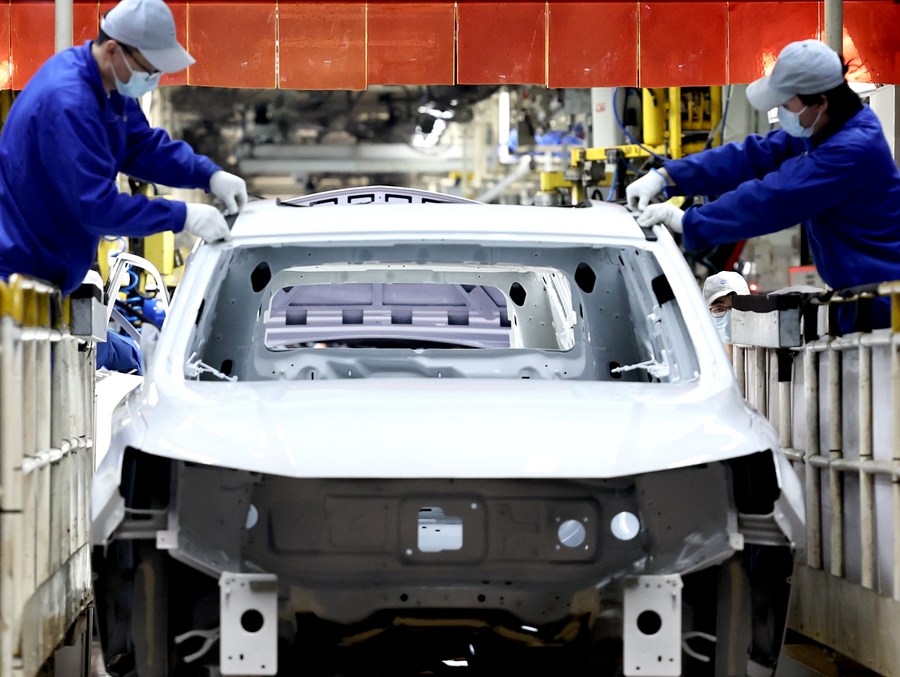
Workers work at the assembly workshop of automaker SAIC Motor Company's Lingang base in Shanghai, east China, April 23, 2022. (Xinhua/Chen Jianli)
BEIJING, May 7 (Xinhua) -- While China is still checking new epidemic flare-ups with its dynamic zero-COVID approach, some Western bigots sensed a chance to talk badly about the country's anti-pandemic efforts and heap scorn on the Chinese government's epidemic control policies.
For example, in its latest rant against Shanghai's anti-epidemic fight, The New York Times (NYT) has gone to great lengths to depict an inept Chinese government and question the "legitimacy" of the Communist Party of China (CPC) "in a time of crisis."
But all those jabs have crumbled in the face of facts. As China has struck a fine balance between pandemic control and economic development, its way of taming the virus has proven to be scientific and effective, and has testified to the country's institutional strength.
For more than two years, China has been putting people's lives and well-being first and sticking to its dynamic zero-COVID approach. In the meantime, it has been making dynamic conditions-based adjustments to its targeted epidemic control measures. All these efforts, coupled with an epidemic prevention focus to guard against both inbound cases and domestic resurgence, have enabled the country to restrict the spread of the virus and minimize the epidemic's impact.
As the highly contagious and latent Omicron variant is sweeping the world, multiple Chinese regions have been overshadowed by the current COVID-19 resurgence. But China has been rising to the challenge.
Through a resolute and full implementation of the dynamic zero-COVID approach, and with the whole-hearted support of the Chinese people, Shenzhen in southern China resumed normal work and production in late March as the resurgence subsides, while community transmission has been cut in Jilin Province since mid-April. Racing against time, Beijing has carried out multiple rounds of nucleic acid testing, and has grasped the basic picture of hidden transmission in society.
Besides, data shows the epidemic situation is steadily improving and under effective control in the city of Shanghai. Daily new COVID-19 cases have fallen from a peak of 27,000 to under 5,000, and nearly two-thirds of the infections have recovered in the city. Over 70 percent of Shanghai's 1,800-plus major enterprises have resumed work and production, and the resumption rate of the first batch of more than 660 key industrial enterprises in the city has exceeded 90 percent.
China's capability of successfully arranging massive nucleic acid tests, building makeshift hospitals, dispatching medical staff and delivering much-needed supplies have all demonstrated the country's systemic ability to pool strength behind significant undertakings and the solidarity of the Chinese people.
Under the guidance of the Chinese central government, Shanghai has mobilized nucleic acid testing teams with a daily handling capacity of 2.38 million test tubes. More than 30,000 medics from 22 provincial-level regions nationwide have rushed to the city to aid in the anti-epidemic battle. To many experts, such prompt actions in Shanghai are a miniature of China's unprecedented mobilization and organization abilities made possible out of the strong and wise leadership of the CPC, which has firmly stood as the most reliable backbone of the Chinese nation and people.
According to preliminary statistics in late April, more than 720,000 Party members volunteered to report for duty during the current resurgence in Shanghai. As of April 30, Party members have also helped set up 164 nucleic acid testing sites in the city.
Support from the people makes a difference in the anti-epidemic response, noted a meeting convened on Thursday by the Standing Committee of the Political Bureau of the CPC Central Committee, stressing the need to make sure that the Chinese people are well-informed, and to timely respond to their concerns.
This people-oriented philosophy, warmly welcomed and highly appreciated by the Chinese people, has secured China in achieving major strategic progress. Among major economies, China has been the first to bring the pandemic largely under control, the first to resume work and production, and the first to achieve economic growth. Even though thousands of daily cases have been reported recently, China, the world's most populous country, is still one of the countries with the lowest infection rates worldwide.
"The comprehensive strategy, marked by rapid mass testing, vaccinations and government support in terms of care for the afflicted, stands in stark contrast to what has happened in other jurisdictions around the world," noted Kenya-based international relations scholar Cavince Adhere. "On the basis of the experience, China is now taking right steps for its densely populated cities and around," said Muzaherul Huq, former Southeast Asia Region adviser at the World Health Organization.
The Chinese people's growing confidence in the government's epidemic control policies, as well as the international community's broad recognition of China's anti-pandemic achievements, have slapped the NYT and its like in the face. In the time ahead, more practice will prove that China's epidemic control strategy is the right choice that can stand the test of history. ■



